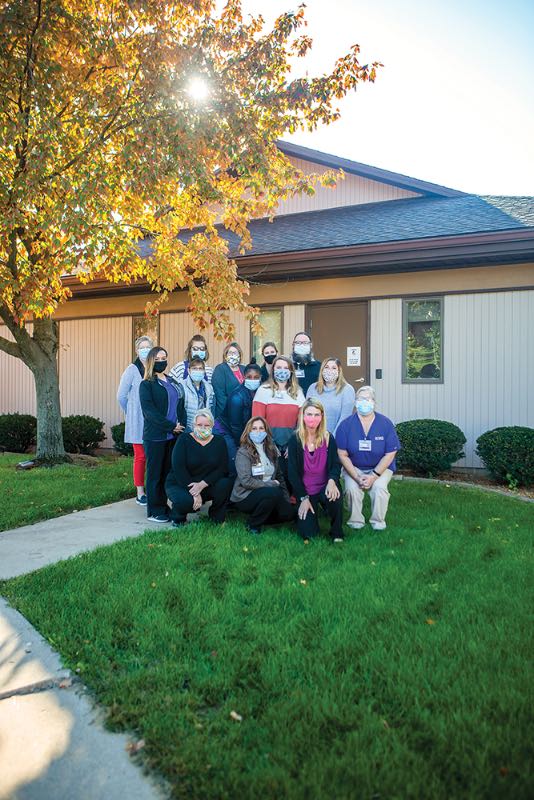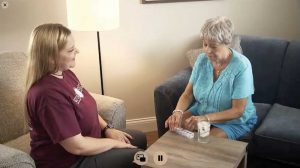By Tana Villanueva, General Manager for VITAS® Healthcare
One of the comments we frequently hear at VITAS® Healthcare from our patients and their families is a very heartfelt sentiment that we hope to change through education: “I wish I had known about hospice sooner.”
November’s designation as National Hospice Month is the perfect opportunity to spread the news about hospice as a medical specialty supporting both patients and their families with clinical, emotional, and spiritual services. Quite simply, hospice helps them face the challenges of an advanced illness as they near the end of life.
Unlike other medical specialties, where patients must select a healthcare provider from a pre-approved list, hospice care is a decision that’s up to you. You choose the hospice provider you want to invite into your home, nursing home, or assisted living facility to help your family make the most of the time that remains.
Once a physician has determined that curative treatments are no longer working, or once you decide that the side effects of your treatments are too much of a burden, it’s time to rely on a hospice provider to help you focus on comfort, closure, and quality of life in your final months, weeks, and days.
Why do our patients and families say they wish they had chosen hospice care sooner in their illness? Several factors stand out:
• VITAS brings hospice care to you, wherever you prefer to receive care. Usually, patients can remain at home, or in their nursing home or assisted living community, surrounded by familiar faces and places that bring comfort. If their symptoms become too much to manage at home, VITAS can arrange for inpatient care in a local nursing home until symptoms resolve.
• Your hospice “specialist” is, in fact, an entire team that works together on your behalf. A hospice physician, nurse, aide, social worker, chaplain, and volunteer all receive special training in end-of-life care, and they work as a team to make sure your medical, emotional, and spiritual needs are met. They create an individualized care plan just for you, and they provide support to patients and caregivers alike to honor your goals, values, and wishes.
• Medicare Part A, Medicaid, TriCare, and many private insurance plans cover up to 100 percent of hospice care, including visits from your doctor, nurse, and aide, as well as extra support from a hospice social worker and chaplain to help connect you with community resources, seek spiritual support, or plan a memorial service.
• Hospice has continued during the COVID-19 pandemic. Just as everyone has been forced to change their normal routines because of the coronavirus, VITAS has adapted its care protocols so patients can continue to receive safe, effective, and supportive hospice care, whether they choose in-person visits or telehealth services. All of our care teams abide by accepted safety and infection-control guidelines for themselves and their patients, including social distancing, masks, regular testing, and adherence to visiting guidelines in private homes, nursing homes, and other care facilities. When in-person care is not possible, our teams evaluate, assess, admit, and care for patients using FaceTime, WhatsApp, Google Duo, or Microsoft Teams for telehealth patient visits and educational sessions for caregivers.
Because hospice is a specific Medicare benefit, all hospice providers must provide the same four levels of care: routine care in the home (or your preferred setting); continuous care at the bedside to manage and stabilize serious symptoms at home; inpatient care when symptoms and pain can no longer be managed at home; and respite care for a patient for up to 5 days and nights in a Medicare-approved facility to give their caregivers a break (for rest, travel, or other commitments).
What differentiates one hospice provider from another are the additional services they provide to ensure patients and their families have access to the support and expertise they need, especially when confronted with serious illnesses like cancer, advanced heart disease or lung disease, Alzheimer’s or dementia, or stroke.
At VITAS, those differentiators set us apart.
First, patients and families never get an answering machine when they call VITAS, whether they call after hours, on the weekend, or during a holiday. Our Telecare team is staffed by clinicians who answer the phone 24/7 when patients or caregivers have questions or when symptoms worsen. Telecare members can manage and triage symptoms over the phone, and if necessary, they can dispatch a team member to the patient’s bedside to provide care and bring symptoms under control.
With Telecare support, patients can usually avoid unwanted and unnecessary trips to the hospital or emergency department. Once their symptoms have eased, patients can return to the routine level of care at home.
VITAS also provides extra services. Hospice music therapists, for example, visit with patients in person or on video platforms to sing, perform, prompt memories, and create new ones by enjoying the calming, spirit-lifting effects of music. Bereavement support is available for family members up to 13 months after a death, including phone-in and Zoom support groups. Our sewing volunteers craft personalized Memory Bears from a patient’s clothing or donated fabric. Each bear is a soft, cuddly reminder of a special person for surviving family members.
How do you know when it’s time to think about hospice?
Patients must meet certain guidelines to be eligible for hospice care, per Medicare. Their physician must certify that a patient has 6 months or less to live, if the disease runs its normal course.
But it’s never too soon to explore the value and benefits of hospice care if you or your loved one is suffering from an advanced, chronic illness. A VITAS hospice nurse can meet with patients and their families at any time for a free evaluation. The nurse will assess the patient, ask about symptoms and overall health, explore the patient’s and family’s wishes, and discuss options.
It’s never too late to start the conversation
If the patient is eligible for hospice care, service can usually begin within 24 hours. And if the patient does not meet eligibility requirements, patients and families can still have their questions answered and begin discussing their goals and wishes for end-of-life care when the time is right.
VITAS teams can also facilitate goals-of-care conversations, help patients/families fill out a living will, or help them complete the paperwork that designates someone to make healthcare decisions on a patient’s behalf if they are ever unable to communicate.
The most important to thing to know about hospice is that it’s not a place. It’s a whole range of services by a team to support patients and families at one of the most challenging—and most meaningful—phases of life.
Just as patients with cancer want to be cared for by the best cancer experts, patients facing the end of life want to be cared for by the best specialists in end-of-life care. That’s what hospice is: care tailored specifically for patients who want to focus on quality of life near the end of life.
When it’s time for hospice care, you have choices. Choose the provider who will surround you with expertise and services to help you embrace quality of life—for you and the people who mean the most to you.
For more information about hospice and end-of-life care options, call VITAS Healthcare at 309.691.2381 or visit VITAS.com.
Tana Villanueva is general manager for VITAS® Healthcare, the nation’s leading provider of end-of-life care and a hospice provider in LaSalle/Central Illinois since 2007.
Read more informative and inspirational articles in 50 Plus News and Views Bloomington/Normal.










